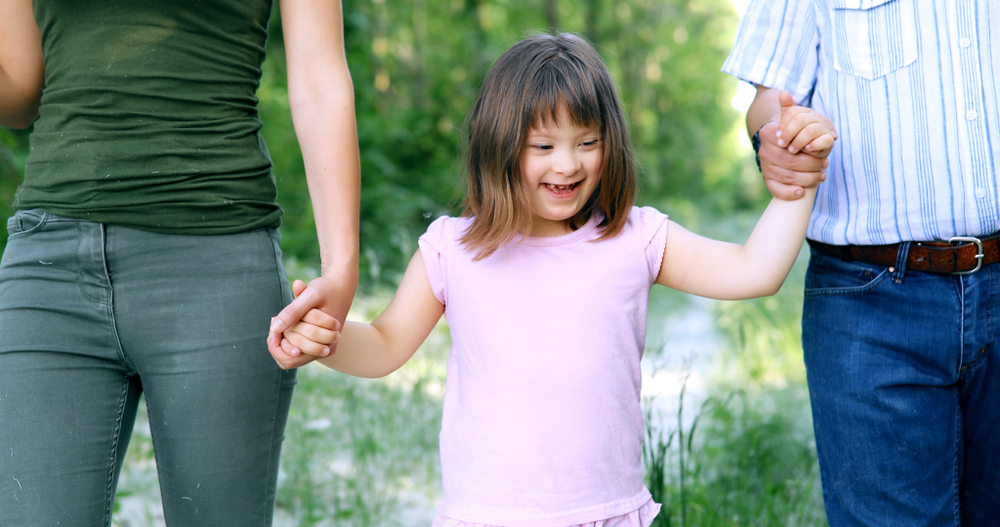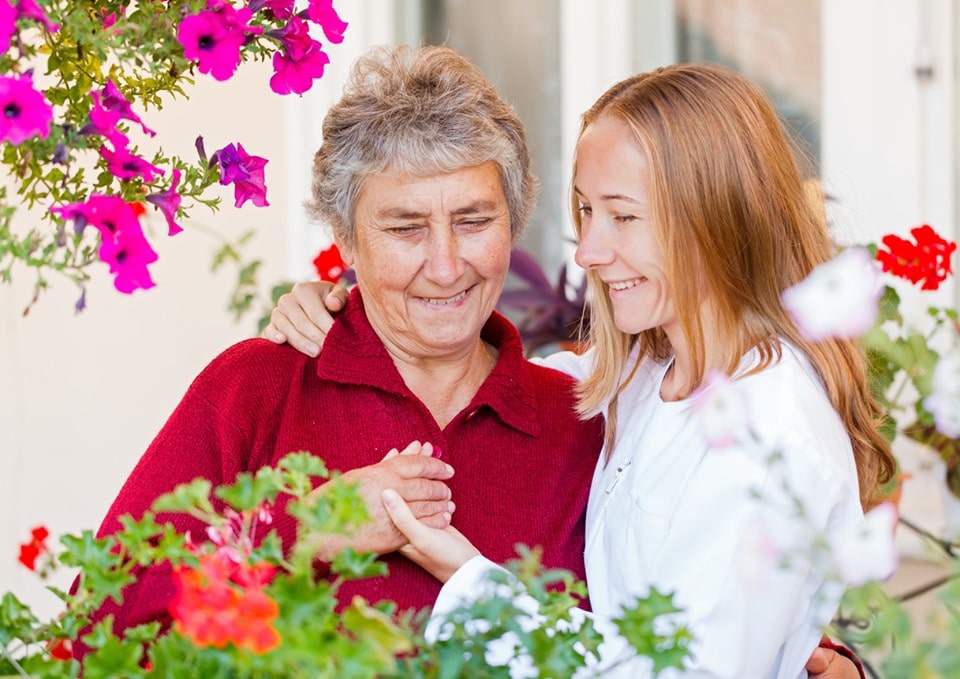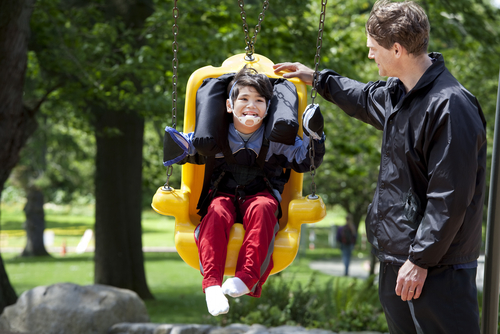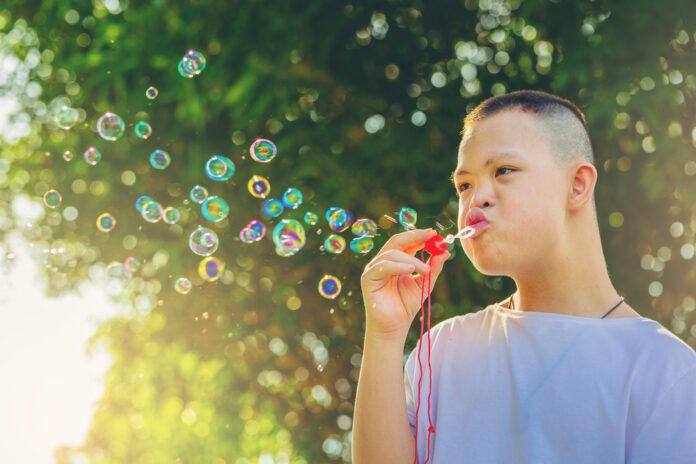Springtime is the perfect time to enjoy fresh air, sunshine and Mother Nature through a variety of sensory-friendly activities, including tons of fun for children with disabilities and/or special needs.
Studies have concluded that nature is good for one’s overall health. According to the American Society of Landscape Architects, time spent outdoors enhances self-esteem and mood, improves cognitive function and memory-related abilities, and increases attention spans among children with autism spectrum disorder, to name a few of the many known benefits. It’s exciting to know that countless research studies continue to show that nature-based activities for children with special needs positively impact physical, emotional, social and cognitive development.
So, here are ten simple, yet effective sensory-friendly activities for kiddos with special needs to enjoy this spring.
-
Bubbles
There are a ton of high-tech toys now available for purchase to entertain little cuties that have special needs or developmental delays. And, of course, AmeriDisability doesn’t want to burst the bubble on these awesome disability-tech advancements! But sometimes inexpensive, basic toys create just the priceless engagement that families desire. We’re talking about the precious pastime of blowing bubbles.
Children can work on dexterity and hand-eye coordination as they dip the stick into the jug. Then, watch their oral motor skills magically create bubbles in all shapes, sizes and colors. For those who need a little assistance, either a handheld bubbler or automatic bubble machine might do the trick. And if the smell of fresh-cut grass and flowers blooming in your yard doesn’t stimulate enough, consider adding drops of scented soap or essential oils into the bubbles to achieve an enhanced aromatic experience.

-
Fruit Picking
Wouldn’t a visit to a u-pick farm to gather fresh fruit with the apple of your eye be an added cherry to top off a lovely spring day? The wide-open spaces of local farms are typically pretty comfortable for youngsters that tend to get overwhelmed by more crowded environments. Click over to PickYourOwn.org to find a list of u-pick farms with site details, seasonal produce calendars, recipes and events.
Families, and especially those with special needs, know to plan ahead. So while farms may provide containers for fruit collection, other onsite amenities may vary greatly at differing locations. Consider bringing snacks (allergy-free if needed), water, sunscreen, hats and/or sensory-friendly clothing, handi-wipes, cash (as some farms don’t take credit cards) and perhaps a cooler to transport your freshly-picked produce. It’s also important to note that restrooms may not be available or limited to port-o-lets, so consider taking a bathroom break before arrival or planning accordingly.
Children are more inclined to try new foods, including fruits and vegetables, if and when they are involved in the process. So your picky eater might just be willing to try a blackberry (or other new food) if he/she personally picked it off the bush. U-pick farms are a great way to influence the consumption of healthy foods, especially since people with disabilities can find it more difficult to eat healithy, control their weight and be physically active.
-
Gardening
According to Obsessed Lawn, an online gardening resource and buying guide, gardening can be an effective form of therapy for individuals with special needs. Not only does it get budding gardeners involved in an activity where they will accomplish something amazing in nature, but gardening also helps develop cognitive reasoning and motor skills. Little diggers can work their hands into the dirt and feel the many textures of the Earth.
Research suggests that gardening reduces stress and depression symptoms, while boosting muscle strength, mental clarity and a sense of accomplishment. Plus, similarly to the fruit picking activity suggestion, food gardeners who increase consumption of fresh fruits and vegetables can reap the added benefits of a decreased waistline and a lowered risk of cardiovascular disease and cancer.

Accessible Gardens is a specialty outdoor company that produces versatile raised garden beds for customers with physical limitations, to make gardening engaging for most including wheelchair users. The Rhode Island-based business was founded in 2008 by Raymond LaRocque, who was eager to work his green thumb despite having an autoimmune-related spinal cord injury. Plus, there are plenty of options when it comes to accessible garden tools for all abilities.
Those interested in insects may enjoy growing milkweed plants and other pollinating plants that attract butterflies, bees and beautiful bugs. Or, build, decorate and hang a birdhouse with your little chickadees to attract the sweet, soothing chirps of colorful creatures.
-
Jogging or Biking
Sensory-seekers usually like fast, constant movement activities. Riding bicycles or scooters together is a fast-paced way to partake in fun exercise while outdoors. Families with special needs have plenty of options when it comes to adaptive bikes, tricycles, hand-bikes, ride-along seats, comfy bike trailers and so on. With gorgeous temperatures, many sensory-seeking kiddos may also love riding in a jogging stroller while mom or dad breaks a sweat.
-
Kindness Rocks
Ever noticed a somewhat hidden painted rock with a positive message on it? A grassroots movement, called the Kindness Rocks Project, has gained momentum in recent years with its goal to cultivate connections within communities and lift others up through simple acts of kindness. Give it try by creating some of your own meaningful designs, get messy with the paint and focus on lifting spirits through the power of positive words. This is a beautiful way to promote inclusion and empathy. To take this idea a step further, hide the rocks throughout your neighborhood and send out an invitation for friendly neighbors to participate in a Kindness Rocks scavenger hunt!
-
Hiking
The National Parks Service (NPS) has several pass programs that grant access to more than 2,000 federal recreation sites across the nation, including National Parks, National Wildlife Refuges and many National Forest and other federal recreation lands. A pass may cover entrance, standard amenity fees and day-use fees for a driver and all passengers in a personal vehicle and may also offer other discounts. Those with disabilities should obtain an Access Pass. This free, lifetime pass is available to U.S. citizens or permanent residents that have a disability. NPS also offers a Military Pass, Senior Pass and other options.
-
Park Play
Play helps children grow and learn — how they move, how their muscles work, their tactile senses, vision and hearing… all develop as they play. And physical learning contributes to cognitive development, as children hone their motor skills and spatial perception. A trip to the playground can stimulate social engagement and, of course, present many sensory exploration opportunities. Kids may love digging in the sandbox, climbing a rock wall, swinging on the monkey bars, bouncing on the seesaw and soaring high and fast on the swings, among other play opportunities. More and more communities are opening inclusive playgrounds that better foster a welcoming environment for children of all abilities. This includes wheelchair-friendly ramps, braille play stations and more.

-
Sidewalk Chalk
Art therapy, which includes exposure to color (i.e. chromotherapy), is considered an effective rehabilitative method to aid physical and emotional health. As with physical therapy, repetitive exercise (i.e. painting strokes) of weakened muscles can help people with mobility issues gain elasticity, strength and balance. For mental wellbeing, art therapy boosts creative expression, ignites a calming effect and can relieve stress. In fact, a study from University College London found that the same parts of the brain are stimulated when one looks at art as when one is in love; both release the chemical dopamine promoting feelings of affection and desire. Now that’s powerful, right?
You don’t need to be a certified art therapist to tap into the creativity of your budding artist. Informal art exposure at home ─ or, better yet outdoors in your yard ─ can help children with special needs boost energy and happiness, and decrease depression and anxiety.
Nature has a special way of inspiring artistic creation. Grab some watercolors and head outdoors to create masterpieces together. But, for easy breezy art in the sunshine, sidewalk chalk is the best bet! You don’t need any special canvases, just the sidewalk or driveway and whatever chalk color your little hearts desire. With sidewalk chalk, you can practice letters, numbers, shapes, sight words, writing affirmations and, of course, finally fine-tune your attempts at drawing rocket ships, sailboats, rainbows and tons of other pictures. And clean-up is totally simple… just shake chalk dust off of clothes, wash up in the bathroom sink and let the rainclouds organically clear your cement canvas for a clean slate for your next sidewalk chalk play date.
-
Spring Cleaning
While maybe not the most fun activity on this list, believe it or not some sensory-seeking kids can really get into spring cleaning. The vacuum does scare some sensory-sensitive children, but those who like loud noises enjoy the labor of pushing the loud, heavy machine. And the motion of using a duster is not all that different than stroking a paintbrush. Can cleaning dishes in a super sudsy sink double as water playtime? Sure… especially if you toss a few toys in for cleaning too. And cleaning the car in the driveway is guaranteed springtime fun! You just know that hose is going to ignite a family water squirt competition.
-
Spring-Themed Sensory Bins
Sensory bins filled with textured items like beans, corn, rice, rocks, sand and water beads can make for stimulating bases to fill with scoopers and toys. To make a bin seasonally fun, opt for: (1) pebbles, plants and flower petals tossed with plastic bugs and butterflies; (2) pastel-colored sprinkles mixed with toy bunnies, chicks and farm animals; or (3) firm, blue gelatin filled with seashells and toy sea animals.

Also try:
- Camping (at an accessible site for experienced campers, or the backyard for novice campers)
- Catch fireflies
- Glow stick dance party in the yard
- Hopscotch
- Picnics
- Stargazing
- Water play, such as sprinklers, slip n’ slid, kiddie pool, etc.
As a reminder, some people with special needs may be heat or sun intolerant due to a specific disability, condition or because of prescribed medication. Do enjoy the outdoors safely with ample shade, sunscreen and hydration.
Happy Spring! Wishing you a sensational season.






